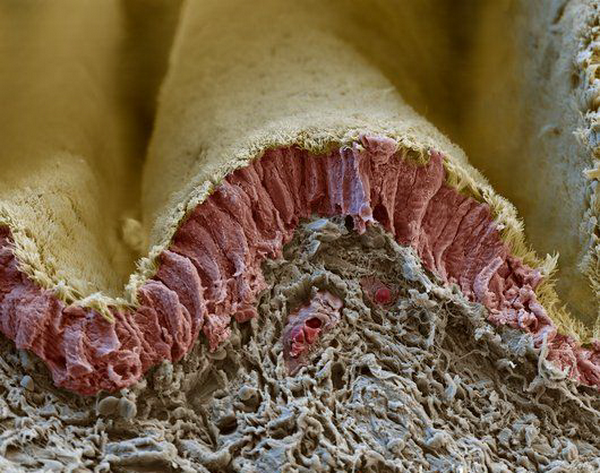As the intestines and lungs protect themselves from bacterial invasion
 Bashny.Net
Bashny.Net

Scientists have found in intestinal epithelial cells and lung antibacterial signaling a new system.
The relationship of our immunity and bacterial microflora resemble intricate political thriller - even despite the fact that on this subject were published, not afraid of this word, tons of articles. And now researchers from the Institute of Allergy and Immunology in La Jolla (USA) reported an unprecedented molecule, by which epithelial cells of the lungs and intestines kicking against pathogens such as pneumococci and pathogenic species of E. coli.
The molecule in question is called HVEM (herpes virus entry mediator) and belongs to the family of tumor necrosis factor receptors. Should immediately clarify that the existence of this receptor has long been known, it just does not come to the attention of scientists. In an article published in the journal Nature, the researchers write that mice devoid of this protein is much more susceptible to pneumococcal infection: normal mucosal barrier ceased to protect cells from invading pathogens.
It turned out that HVEM receptor and receptor for immune proteins IL-22 act as sentries, reacting to the slightest "intrusion attempt." Without HVEM not work properly to prevent the immune system: of course, the fact that the invasion will be seen, but the number of immune cells is too low, and bacteria still deployed harmful activity. And with HVEM epithelial cells may request immunity symmetrical response threat. It is necessary to say once again that there is still about the signaling system no one knew.
The practical importance of the obtained results can not describe. Suffice it to say that the pneumococcus, which causes meningitis and pneumonia each year causes the death of 1, 4 million children under five years. This figure can be significantly reduced if you learn to work with the newly opened antibacterial signaling.
Tags
See also
Why time apart is healthy
5 most staggering things that science has learned to do (5 photos)
5 most mind-blowing things learned how to make science
Increase the body's defenses: a useful millet soup and garlic!
Daniel Golman: Attention is a muscle that must be trained
Discussion and condemnation is all empty...
As advertising deceives buyers
12 amazing facts about your digestive system

















